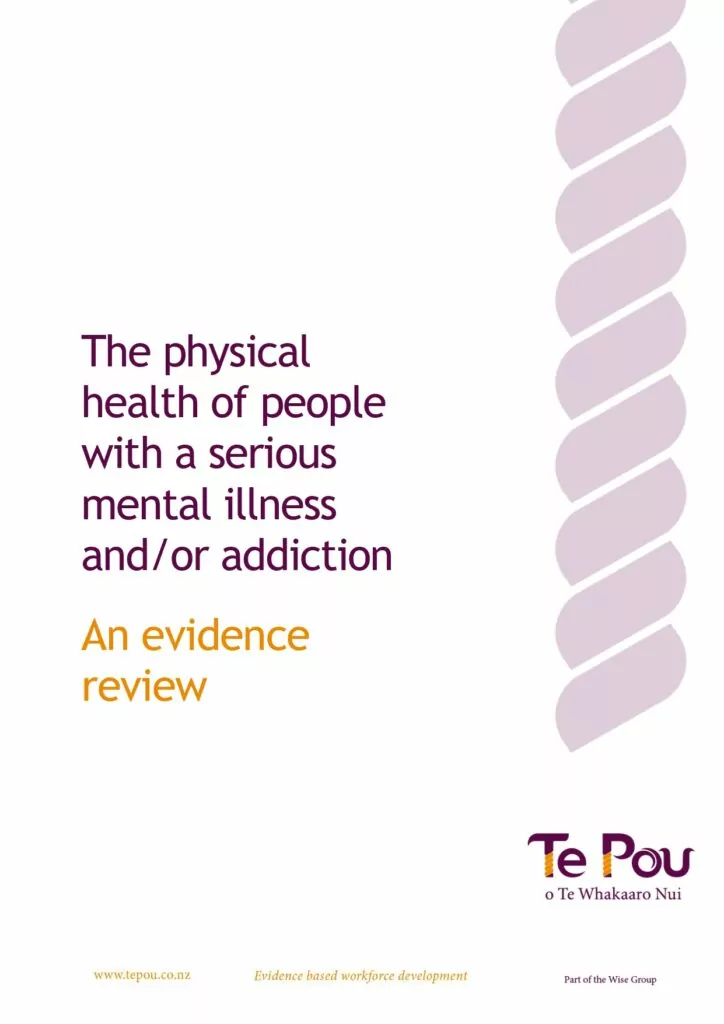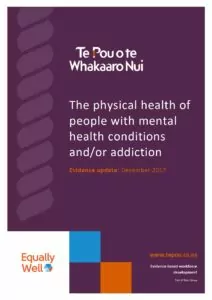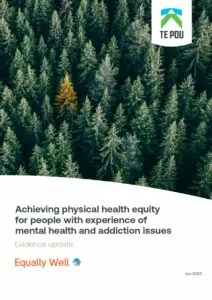Our mahi
Equally Well is a connected, action-focused collaborative movement involving people and organisations pursuing the “common goal of achieving physical health equity for people who experience mental health and addiction issues”.
Ngā Waka o Matariki is the Equally Well Māori Health Strategy. It is the life force, energy and air for the collaborative: inspiring champions to action which ensures and promotes Māori and whānau health equity inclusive of health equity of everyone living with mental health and addiction issues.
The top three things we are aiming for
-
Equally Well’s vision is that people living with mental health and addiction issues enjoy longevity and a quality of life comparable to their peers without mental health and addiction issues.
-
We want to see physical health of people with mental health and addiction issues promoted, valued and actively supported throughout the health system.
-
That any physical health issues are picked up early and responded to with high quality support and treatments, free of stigma and discrimination.
How Equally Well works
The way we work is a little different.
Since 2014 Equally Well has operated through a collective impact approach. It is an intentional way of working together and sharing information for the purpose of solving a complex problem.
Imagine Equally Well as a network with interconnected hubs of action led by people and organisation with particular interests or strengths. Partners of Equally Well lead their own action hubs and other champions or organisations can link in with the specific actions. We can have as many hubs of action as we like – some may be time limited, others continue and evolve their focus.
These action hubs are interconnected and communicate across the collaborative. The work is then supported by a collaborative leadership group, who provides strategic oversight and guidance for the collaborative, and a backbone team, who facilitates, supports and drives all activity.

Diagram of the Equally Well collaborative structure.
A key element of collective impact is having a backbone team which links and co-ordinates regional, national, and international activity among partners. For Equally Well, this team is hosted by Te Pou, Platform and Ember.
The people involved in the various action hubs come from a range of organisations, including lived experience communities, Māori, mental health and addiction services and the broader health sector, particularly primary care.
Champions (advocates) can come from lived experience (and Māori), whānau, academic, policy, general practice, nursing, psychiatry, support work, public health, pharmacy, and cardiology backgrounds. People and organisations that have made a formal commitment to Equally Well make up the endorsing organisations. These include government (primary health organisations, Te Whatu Ora localities) and non-government organisations (NGOs), general practices, and health professional bodies, like RNZCGP, RANZCP and RACP, Te Ao Māramatanga, the Council of Medical Colleges, and Take Notice Ltd, a Māori lived experience organisation.
Working towards physical health equity
In May 2021, tāngata whai ora defined as “people with a diagnosis of severe mental illness, or those in contact with specialist mental health and addiction services” were included in priority group three for earlier COVID-19 vaccination. This was the result of action at multiple levels by those in the Equally Well collaborative. From championing at a strategic policy level to providing evidence on the increased health risks of COVID-19 for people who experience mental health and addiction issues, everyone in the collaborative collectively worked together to raise awareness of the need for this group to be prioritised for vaccination.
“The Equally Well collaborative, an evidence-informed and action-focused network of champions across the country, are collecting and sharing examples of good practice. It is this collaborative approach that is crucial at times like this, as it takes multiple people across the health and health-related system to address health inequities.” ¹
Once acknowledged as a priority group, the work of the collaborative did not stop there. Wild Bamboo, an Equally Well champion organisation created Tūtohi, an online data platform to to track the COVID-19 vaccination rollout for tāngata whai ora and provide accessible, up to date data to Equally Well champions to continue taking action and advocating to address vaccination inequities. An example is the campaign launched by Nōku Te Ao who contributed to the vaccine inequity conversation with Tū Pakari, Tū Taha: Stand Strong, Stand Beside. This video series addresses the structural discrimination faced by tāngata whai ora through personal stories and experiences.
Once antiviral medications to treat COVID-19 symptoms became available in Aotearoa New Zealand, Equally Well champions wrote to Pharmac to ensure ‘mental health and addiction issues’ was included in the eligibility criteria for access to the antiviral medications. The access criteria for COVID-19 anti-viral medication can be found here.
In addition, Te Whatu Ora released funding for peer-led organisations to support tangata whai ora to access COVID-19 vaccination and provide peer support for physical health. More information about the organisations providing this support can be found here.
Ultimately, this inclusion of people who experience mental health and addiction issues as a priority group is an example of what Equally Well can do when we all act at multiple levels. Together we can bring about change and make a difference.
References:
¹ Every-Palmer, S., Koning, A., Smith, L., Cunningham, R., Lacey, C., Peterson, D., … & Lockett, H. (2022). Structural discrimination in the COVID-19 vaccination programme for people with mental health and addiction issues: now is the time to be equally well. The New Zealand Medical Journal (Online), 135(1550), 133-139.
² Lockett, H., Koning, A., Lacey, C., Every-Palmer, S., Scott, K. M., Cunningham, R., … & Chambers, S. (2021). Addressing structural discrimination: prioritising people with mental health and addiction issues during the COVID-19 pandemic. The New Zealand medical journal, 134(1538), 128-134.


